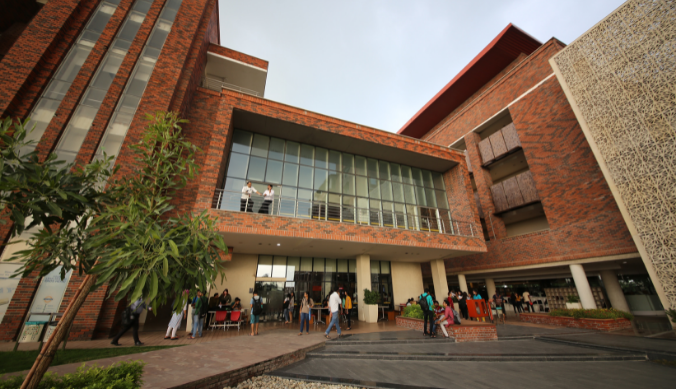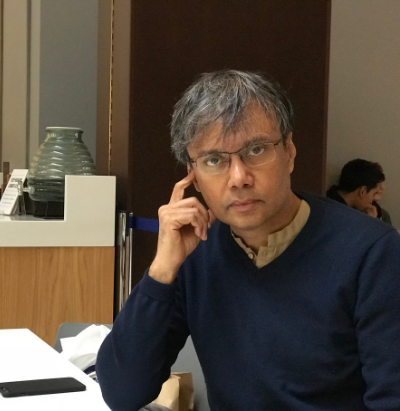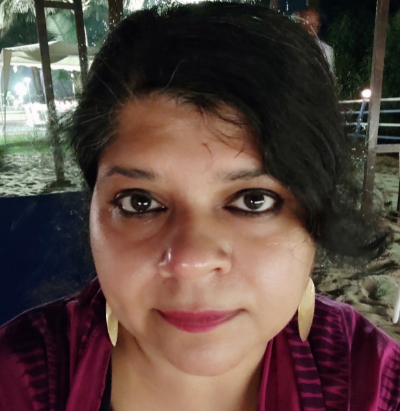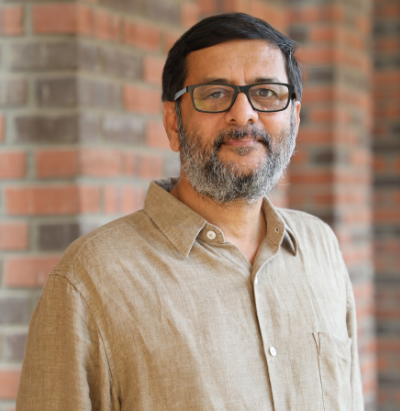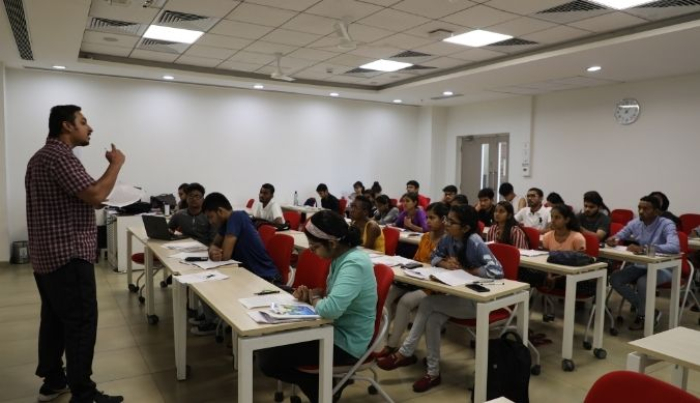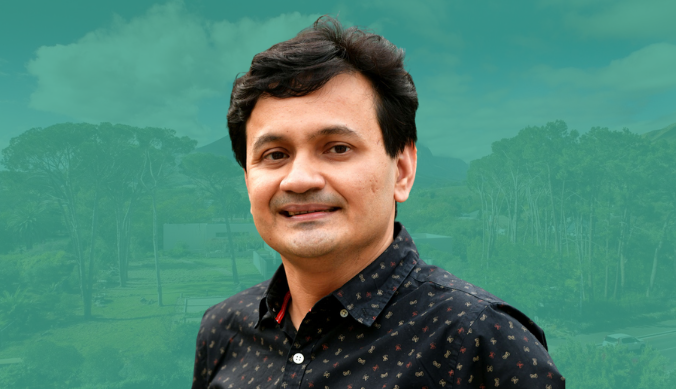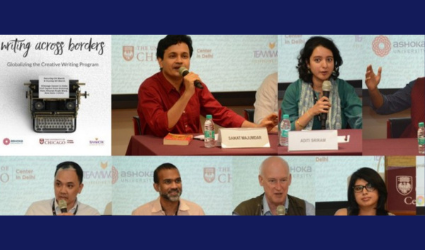Department of Creative Writing
The Creative Writing programme exposes undergraduates at Ashoka University to the practice of writing poetry, fiction, nonfiction and translation. Students also have the opportunity to explore their interests in other emerging genres depending on available faculty expertise in them. The Creative Writing department at Ashoka includes writers, translators, poets, and people who’ve worked in the field of publishing. We offer courses in fiction, poetry, translation, and more. Our classes provide students with an opportunity to sharpen their interest in different forms of writing. Courses offered by the department assist the interpretation of literature from the point of view of a practitioner. The department offers a minor and a concentration.
Creative Writing also collaborates with the Department of English to offer the Interdisciplinary B.A. in English and Creative Writing. Please refer to the English Department website for further details.
Ashoka also offers an M.A. in English with a concentration in Creative Writing. Please refer to the English M.A. website and handbook for details on that programme
Faculty at Creative Writing
Head of Department, Professor of Creative Writing, Ashoka University
DPhil in English, Oxford University
Professor of English and Creative Writing, Ashoka University
Ph.D. Rutgers University
Assistant Professor of Creative Writing and History of Art, Ashoka University
English Literature, St.Stephen's College History of Art, School of Oriental and African Studies
Associate Professor of Creative Writing, Ashoka University
Ph.D. University of North Bengal
Professor of Practice in Creative Writing, Ashoka University
Visiting Professor of Creative Writing, Ashoka University
Visiting Faculty of Creative Writing, Ashoka University
Visiting Professor of Creative Writing, Ashoka University
Teaching Assistantship for UG Students
Eligibility: 3rd or 4th year UG students who are completing their minor thesis requirement in the concerned academic year, or have already done so. Preference will be given to students who have not done a CW TAship before.
Application Procedure: The Head of Department will notify the students and send out the invitation for applications. The eligible and interested students may apply via email.
What the TAs earn: 4 credits for Teaching Practicum and are noted on the transcripts. It does not count towards the Minor or the ASP.
WP_Query Object
(
[query] => Array
(
[post_type] => tribe_events
[posts_per_page] => 5
[post_status] => publish
[orderby] => Array
(
[post_date] => ASC
[tec_event_start_date] => ASC
)
[order] => DESC
[tax_query] => Array
(
[0] => Array
(
[taxonomy] => post_tag
[field] => term_id
[terms] => 1548
)
)
[meta_query] => Array
(
[tec_event_start_date] => Array
(
[key] => _EventStartDate
[compare] => EXISTS
)
[tec_event_end_date] => Array
(
[key] => _EventEndDate
[value] => 2024-04-27 11:02:05
[compare] => >=
[type] => DATETIME
)
)
)
[query_vars] => Array
(
[post_type] => tribe_events
[posts_per_page] => 5
[post_status] => publish
[orderby] => Array
(
[post_date] => ASC
[tec_event_start_date] => ASC
)
[order] => DESC
[tax_query] => Array
(
[0] => Array
(
[taxonomy] => post_tag
[field] => term_id
[terms] => 1548
)
)
[error] =>
[m] =>
[p] => 0
[post_parent] =>
[subpost] =>
[subpost_id] =>
[attachment] =>
[attachment_id] => 0
[name] =>
[pagename] =>
[page_id] => 0
[second] =>
[minute] =>
[hour] =>
[day] => 0
[monthnum] => 0
[year] => 0
[w] => 0
[category_name] =>
[tag] =>
[cat] =>
[tag_id] => 1548
[author] =>
[author_name] =>
[feed] =>
[tb] =>
[paged] => 0
[meta_key] =>
[meta_value] =>
[preview] =>
[s] =>
[sentence] =>
[title] =>
[fields] =>
[menu_order] =>
[embed] =>
[category__in] => Array
(
)
[category__not_in] => Array
(
)
[category__and] => Array
(
)
[post__in] => Array
(
)
[post__not_in] => Array
(
)
[post_name__in] => Array
(
)
[tag__in] => Array
(
)
[tag__not_in] => Array
(
)
[tag__and] => Array
(
)
[tag_slug__in] => Array
(
)
[tag_slug__and] => Array
(
)
[post_parent__in] => Array
(
)
[post_parent__not_in] => Array
(
)
[author__in] => Array
(
)
[author__not_in] => Array
(
)
[search_columns] => Array
(
)
[meta_query] => Array
(
[tec_event_start_date] => Array
(
[key] => _EventStartDate
[compare] => EXISTS
)
[tec_event_end_date] => Array
(
[key] => _EventEndDate
[value] => 2024-04-27 11:02:05
[compare] => >=
[type] => DATETIME
)
)
[ignore_sticky_posts] =>
[suppress_filters] =>
[cache_results] => 1
[update_post_term_cache] => 1
[update_menu_item_cache] =>
[lazy_load_term_meta] => 1
[update_post_meta_cache] => 1
[nopaging] =>
[comments_per_page] => 50
[no_found_rows] =>
)
[tax_query] => WP_Tax_Query Object
(
[queries] => Array
(
[0] => Array
(
[taxonomy] => post_tag
[terms] => Array
(
[0] => 1548
)
[field] => term_id
[operator] => IN
[include_children] => 1
)
)
[relation] => AND
[table_aliases:protected] => Array
(
[0] => wp_term_relationships
)
[queried_terms] => Array
(
[post_tag] => Array
(
[terms] => Array
(
[0] => 1548
)
[field] => term_id
)
)
[primary_table] => wp_posts
[primary_id_column] => ID
)
[meta_query] => WP_Meta_Query Object
(
[queries] => Array
(
[tec_event_start_date] => Array
(
[key] => _EventStartDate
[compare] => EXISTS
)
[tec_event_end_date] => Array
(
[key] => _EventEndDate
[value] => 2024-04-27 11:02:05
[compare] => >=
[type] => DATETIME
)
[relation] => AND
)
[relation] => AND
[meta_table] => wp_postmeta
[meta_id_column] => post_id
[primary_table] => wp_posts
[primary_id_column] => ID
[table_aliases:protected] => Array
(
[0] => wp_postmeta
[1] => mt1
)
[clauses:protected] => Array
(
[tec_event_start_date] => Array
(
[key] => _EventStartDate
[compare] => EXISTS
[compare_key] => =
[alias] => wp_postmeta
[cast] => CHAR
)
[tec_event_end_date] => Array
(
[key] => _EventEndDate
[value] => 2024-04-27 11:02:05
[compare] => >=
[type] => DATETIME
[compare_key] => =
[alias] => mt1
[cast] => DATETIME
)
)
[has_or_relation:protected] =>
)
[date_query] =>
[request] =>
SELECT SQL_CALC_FOUND_ROWS wp_posts.ID
FROM wp_posts LEFT JOIN wp_term_relationships ON (wp_posts.ID = wp_term_relationships.object_id) INNER JOIN wp_postmeta ON ( wp_posts.ID = wp_postmeta.post_id ) INNER JOIN wp_postmeta AS mt1 ON ( wp_posts.ID = mt1.post_id )
WHERE 1=1 AND (
wp_term_relationships.term_taxonomy_id IN (1553)
) AND (
wp_postmeta.meta_key = '_EventStartDate'
AND
( mt1.meta_key = '_EventEndDate' AND CAST(mt1.meta_value AS DATETIME) >= '2024-04-27 11:02:05' )
) AND wp_posts.post_type = 'tribe_events' AND ((wp_posts.post_status = 'publish'))
GROUP BY wp_posts.ID
ORDER BY wp_posts.post_date ASC, CAST(wp_postmeta.meta_value AS CHAR) ASC
LIMIT 0, 5
[posts] => Array
(
)
[post_count] => 0
[current_post] => -1
[before_loop] => 1
[in_the_loop] =>
[comment_count] => 0
[current_comment] => -1
[found_posts] => 0
[max_num_pages] => 0
[max_num_comment_pages] => 0
[is_single] =>
[is_preview] =>
[is_page] =>
[is_archive] => 1
[is_date] =>
[is_year] =>
[is_month] =>
[is_day] =>
[is_time] =>
[is_author] =>
[is_category] =>
[is_tag] => 1
[is_tax] =>
[is_search] =>
[is_feed] =>
[is_comment_feed] =>
[is_trackback] =>
[is_home] =>
[is_privacy_policy] =>
[is_404] =>
[is_embed] =>
[is_paged] =>
[is_admin] =>
[is_attachment] =>
[is_singular] =>
[is_robots] =>
[is_favicon] =>
[is_posts_page] =>
[is_post_type_archive] => 1
[query_vars_hash:WP_Query:private] => d91e2a90d6d5571c39f8322eb480dbf8
[query_vars_changed:WP_Query:private] => 1
[thumbnails_cached] =>
[allow_query_attachment_by_filename:protected] =>
[stopwords:WP_Query:private] =>
[compat_fields:WP_Query:private] => Array
(
[0] => query_vars_hash
[1] => query_vars_changed
)
[compat_methods:WP_Query:private] => Array
(
[0] => init_query_flags
[1] => parse_tax_query
)
[tribe_is_event] => 1
[tribe_is_multi_posttype] =>
[tribe_is_event_category] =>
[tribe_is_event_venue] =>
[tribe_is_event_organizer] =>
[tribe_is_event_query] => 1
[tribe_is_past] =>
)
News
Prof. Majumdar has been awarded the fellowship to support his research project – The Amateur: autodidactism and self-making in the…
Featuring Sankalp Khandelwal's creative piece developed as an original project over his term at the Young India Fellowship. The piece…
The book which was originally published in January 2019 has received rave reviews for its honest portrayal of same-sex love…
The event served as a platform for 20 participating speakers and moderators from across borders.







